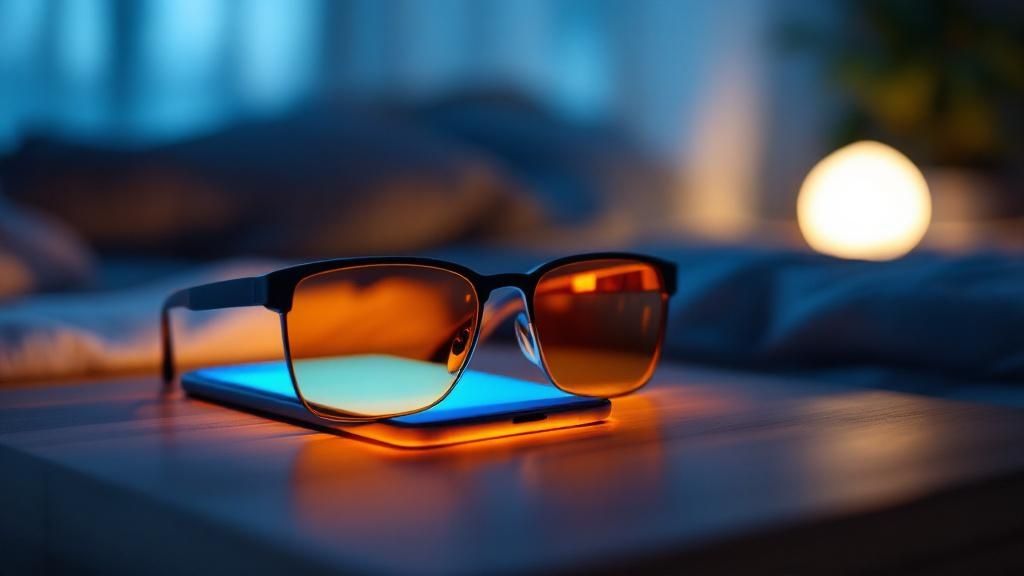
Blue Light Glasses for Sleep: Improve Rest & Sleep Quality
Staring at screens late into the evening can feel a lot like having a shot of espresso right before you try to sleep—it sends a jolt to your brain, telling it to stay alert. The simple truth is that the blue light pouring out of your phone, laptop, and TV is actively working against your body's natural sleep signals. This is where blue light glasses for sleep come in, offering a genuinely effective tool to push back against this very modern problem.
The Hidden Link Between Screens and Poor Sleep
If you’ve ever found yourself scrolling through your phone in bed, only to feel wired and restless minutes later, you’re not just imagining it. You're experiencing a basic biological reaction. Our bodies have spent millennia evolving to follow the rhythm of the sun. Bright, natural light in the morning signals "time to wake up," while the gentle fade to darkness tells us it's time to wind down.
Artificial light, especially the intense, high-energy blue light from our digital devices, throws a massive wrench into this ancient, finely-tuned system.
Before we get into exactly how screens mess with our rest, it's worth remembering the profound impact sleep has on our overall health. Getting quality rest isn't a luxury; it’s a non-negotiable pillar of well-being. It affects everything from your mental clarity and mood to your body's ability to recover and heal. When we trade sleep for late-night screen time, we're doing more than just making it harder to drift off.
How Evening Screen Time Affects Your Body
Picture your brain's sleep-wake cycle as a light-sensitive switch. During the day, sunlight keeps that switch firmly in the "on" position, keeping you alert and active. As evening rolls in and the natural light disappears, that switch is supposed to flip to "off." This flip triggers the release of melatonin, the hormone that makes you feel drowsy and ready for bed.
But the bright blue light from our screens looks a lot like daylight to our brains. It essentially tricks your brain into keeping that "on" switch flipped long after sunset, which stalls the production of melatonin. This creates a frustrating internal conflict: your body is physically tired, but your brain is stubbornly refusing to get the message that it’s time to sleep.
The result? You might find it incredibly difficult to fall asleep, toss and turn all night, and wake up feeling groggy and unrefreshed—even if you got a full eight hours. This isn't just about feeling tired; it's a direct hit to your body's essential repair and recharge processes.
This constant bombardment of artificial light is a new challenge for human biology. While researchers are still exploring all the long-term effects, the evidence is clear that managing our light exposure is critical for getting better sleep. Many people wonder how harmful is blue light for your eyes in a broader sense, but its negative impact on our sleep cycle is particularly well-documented.
We're all exposed to a mix of artificial light sources every evening, often without realizing how much they're affecting our internal clocks.
Common Blue Light Sources and Their Sleep Impact
This table breaks down some of the most common culprits in our homes and how they can interfere with our ability to get a good night's rest.
| Device or Light Source | Typical Evening Use | Potential Impact on Sleep |
|---|---|---|
| Smartphones & Tablets | Scrolling social media, watching videos, reading | High-intensity, close-range exposure directly suppresses melatonin. |
| Laptops & Computers | Finishing work, gaming, browsing the web | Similar to phones, but a larger screen can intensify the effect. |
| LED & Fluorescent Lights | Standard room lighting in many homes | Can emit significant blue light, keeping the brain in "daytime" mode. |
| Televisions | Binge-watching shows, late-night news | Bright, dynamic light from a large screen floods the room and disrupts sleep cues. |
The solution isn’t to give up technology and live in the dark. It’s about being smarter with our light. We need to filter the right kind of light at the right time. This is precisely why blue light glasses designed for sleep have become such an essential part of a healthy evening routine. They create a sort of "digital sunset," signaling to your brain that it's finally time to power down and get the restorative sleep you need.
How Blue Light Messes With Your Internal Body Clock
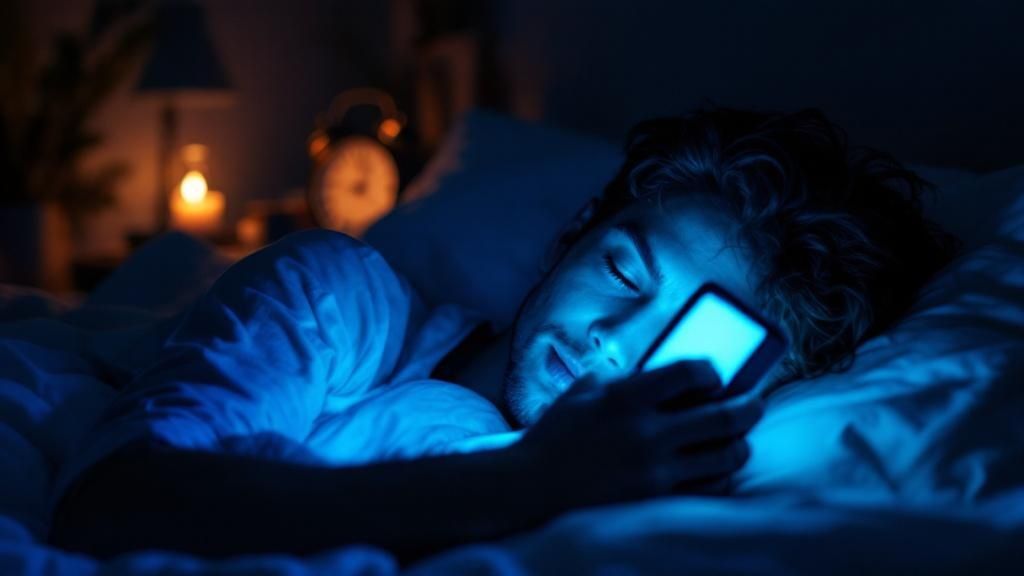
Tucked away deep inside your brain is a "master clock" that pretty much runs the whole show. This is your circadian rhythm, a natural, internal process that follows a roughly 24-hour cycle. It's in charge of everything from when you feel hungry to when you have the most energy. And its most important tool for telling time? Light.
Think of it like an ancient sundial. When that bright, blue-heavy sunlight hits your eyes first thing in the morning, it sends a powerful message straight to your brain: "Wake up! It's daytime, time to be alert and focused." This is a completely natural process, and it’s critical for feeling awake and getting things done all day.
Then, as the sun goes down, the world gets darker and that intense blue light disappears. This absence of blue light is just as important as its presence. It's the signal your master clock uses to tell a tiny part of your brain, the pineal gland, that it's time to start producing melatonin.
Melatonin: The "Hormone of Darkness"
There's a good reason melatonin is often called the "hormone of darkness"—it really only comes out to play when the lights go out. Its main job is to get you ready for bed by lowering your body temperature and heart rate, easing you into a relaxed state, and making you feel sleepy. This slow, steady rise in melatonin is what preps your body for a night of solid, restorative rest.
The whole system works beautifully... until we throw a wrench in the works with artificial light. Especially the kind of high-energy blue light that beams out of our screens.
To your brain, the blue light from your phone, tablet, or laptop looks a lot like the midday sun. When you're scrolling at 11 PM, you're tricking your internal clock into thinking it's still daytime.
This mix-up is a huge problem. It causes your brain to slam the brakes on melatonin production. So even if you're physically exhausted, your body isn't getting the crucial hormonal cue it needs to actually fall asleep. This is why you can end up feeling "tired but wired," tossing and turning instead of drifting off. In fact, studies show that evening exposure to blue light can push back your natural sleep onset significantly.
Why Screen Light Is So Disruptive
Not all light is the same. The light from our digital devices is especially good at messing with our internal clocks, and there are a few key reasons why it's so effective at keeping us awake:
- High-Energy Wavelengths: Blue light has a shorter, more powerful wavelength. This specific type of light is particularly good at telling your brain to stay alert and awake.
- Close Proximity: Think about it—we hold our phones just inches from our faces. This delivers a highly concentrated dose of that sleep-killing light directly into our eyes.
- Long Exposure: Most of us are guilty of scrolling, watching, or working right up until we try to close our eyes. This gives our brains zero time to transition from "day mode" to "night mode."
This constant biological disruption is a massive reason why so many of us struggle to get good sleep in our screen-filled world. This is where blue light glasses for sleep come in. They act as a filter, physically blocking these specific wavelengths from ever reaching your eyes. This lets you use your devices without sending your brain all the wrong signals, allowing melatonin to do its job as nature intended so you can fall asleep faster.
How Blue Light Glasses Protect Your Sleep
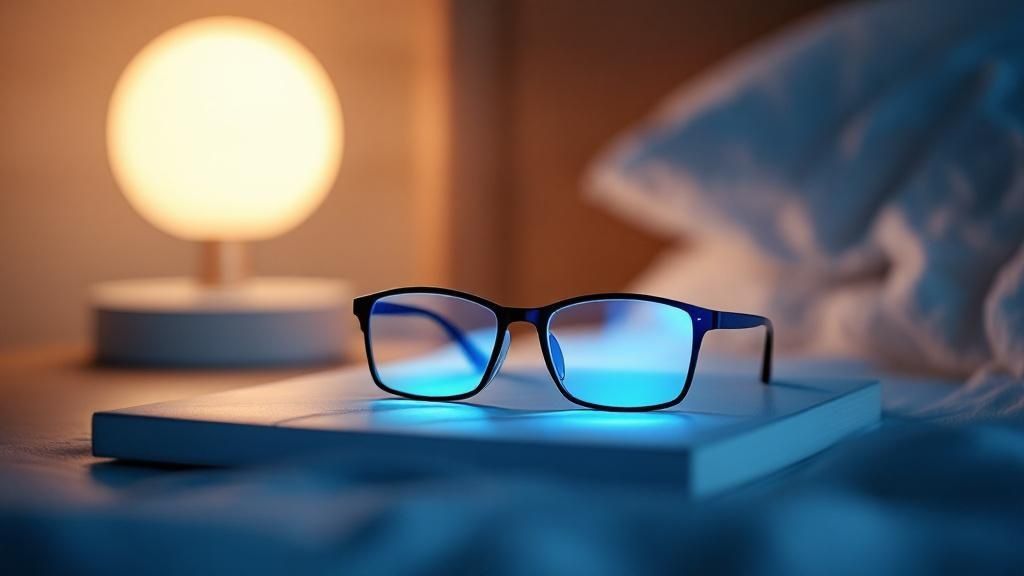 Now that we have a solid grasp on how artificial blue light messes with our internal clock, the fix starts to feel a lot more intuitive. Think of blue light glasses for sleep as a purpose-built shield for your eyes. They’re engineered to specifically target and filter out those high-energy wavelengths that tell your brain it's high noon when it's actually bedtime.
Now that we have a solid grasp on how artificial blue light messes with our internal clock, the fix starts to feel a lot more intuitive. Think of blue light glasses for sleep as a purpose-built shield for your eyes. They’re engineered to specifically target and filter out those high-energy wavelengths that tell your brain it's high noon when it's actually bedtime.
By wearing these glasses, you can go about your evening routine—finishing up work, watching a movie, or just scrolling through your phone—without sending your brain the wrong signals. This simple act of filtering essentially creates a "digital sunset." It tells your body that the day is ending and it’s time to start producing melatonin, just as nature intended.
Filtering the Right Light at the Right Time
The real magic of these glasses lies in their selective filtration. They aren't designed to block out all light. Instead, they focus on that very specific, narrow band of blue light (around 455 nm) that is most notorious for suppressing melatonin. By blocking this disruptive light, the glasses help keep your natural sleep-wake cycle on track, even when you're surrounded by screens.
It’s like you’re putting a guard at the gate of your eyes. This guard has one job: to stop the sleep-sabotaging blue wavelengths from getting in, while letting the less-harmful light pass through. This keeps your melatonin production right on schedule, making it that much easier to fall asleep.
With the massive shift to remote work and online learning, our screen time has exploded, and it's no surprise that sleep problems have followed. Industry reports show a direct line between this digital lifestyle and the growing demand for protective eyewear. The market for blue light glasses swelled to $2.7 billion in 2023 and is on track to hit $5.2 billion by 2032, largely because people are desperately seeking better sleep. You can read more about these market trends for blue light glasses on Acumen Research and Consulting.
Not All Lenses Are Created Equal
This is a critical point: different lenses provide different levels of protection for different situations. The type of lens you pick will make or break how well you protect your sleep.
- Clear or Lightly Tinted Lenses: These are mostly for daytime use. They're great for reducing digital eye strain and headaches at the office because they filter a small amount of blue light, but they do very little to protect your sleep.
- Amber or Orange Lenses: Now we're talking. These are the real workhorses for sleep protection. They block a much higher chunk of blue light and even some green light, making them perfect for wearing in the 1-3 hours before you plan to go to bed.
- Red Lenses: For maximum impact, red lenses offer the most powerful filtration available, blocking nearly all blue and green light. These are best for people who are extremely sensitive to light or anyone who is serious about maximizing their melatonin for a truly deep, restorative night of sleep.
By choosing the right lens for the evening, you’re giving your body the signal it needs to wind down. Your glasses become one of the most important tools in your modern sleep hygiene toolkit.
How to Choose the Right Blue Light Glasses
Diving into the world of blue light glasses can feel a bit overwhelming. There are endless options, and they all seem to claim they’re the best. But here’s the thing: not all blue light glasses are created equal, especially when your main goal is to get better sleep. The secret to making the right choice is understanding one crucial factor: it's not just that they filter light, but what light they filter and how much.
Think of it like buying sunscreen. An SPF 15 lotion is great for some mild, everyday protection, but you'd grab the SPF 50 for a long day at the beach to get heavy-duty defense. Blue light lenses work on a similar principle. Those clear or faintly yellow lenses are your SPF 15; they can help take the edge off digital eye strain and headaches during the workday by filtering a small amount of blue light. But when it comes to protecting your sleep, they're simply not strong enough.
To get real, noticeable sleep benefits, you need a much more powerful filter.
Lens Color Is Your Guide to Protection
The color of the lens is your most important clue. It tells you exactly what kind of protection you're getting. If you're specifically looking for blue light glasses to improve your sleep, you need a tint that’s strong enough to block the precise wavelengths that mess with your body's internal clock.
-
Amber or Orange Lenses: This is the sweet spot for evening use. These lenses are designed to block a huge chunk of blue light, and often a good portion of green light, which research now shows can also disrupt melatonin. The best practice is to wear amber-tinted glasses for 1-3 hours before bed to shield your sleep cycle from your screens.
-
Red Lenses: Think of these as the maximum-strength option. Red lenses block nearly all blue and green light, offering the most comprehensive protection you can get. They're perfect for people who are highly sensitive to light or anyone who's serious about fine-tuning their sleep hygiene for peak performance and recovery.
The image below really drives this point home, showing how stronger filters lead to better rest.
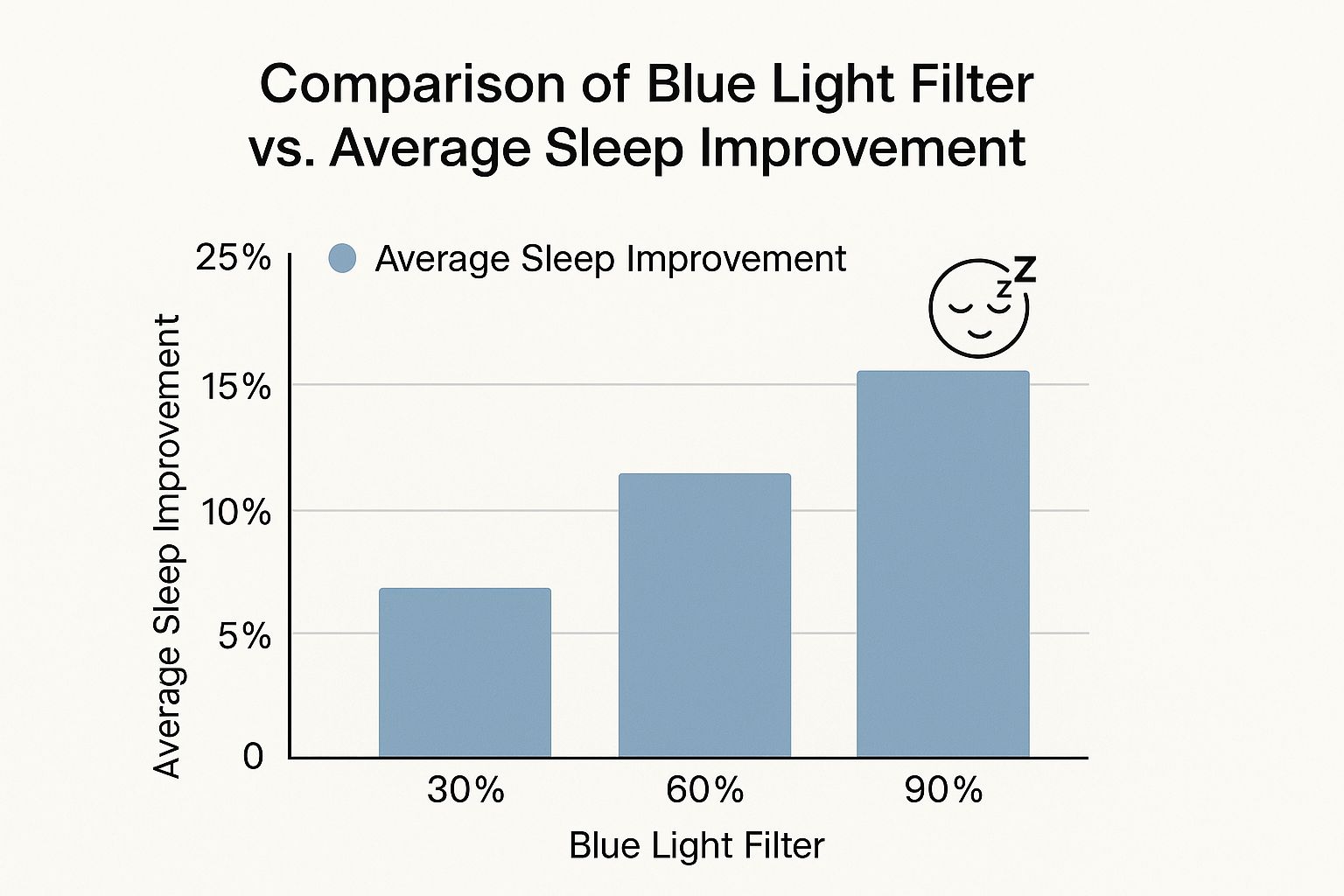
As you can see, the glasses that filter a higher percentage of this disruptive light deliver much more significant benefits for your sleep quality.
The table below provides a quick reference to help you choose the right lens based on your needs.
Lens Color Comparison Guide
Use this table to select the right lens type based on your primary goal, whether it's all-day eye comfort or maximizing your sleep quality.
| Lens Color | Blue Light Filtering Level | Best For | When to Wear |
|---|---|---|---|
| Clear/Light Yellow | Low (3-30%) | Reducing digital eye strain, computer-related headaches, and eye fatigue. | Daytime, while working or gaming. |
| Amber/Orange | High (90-99%) | Protecting melatonin production and improving sleep quality. | 1-3 hours before going to bed. |
| Red | Maximum (99%+) | Ultimate sleep optimization and for those highly sensitive to light. | 1-3 hours before bed for maximum effect. |
Ultimately, having a daytime pair and a nighttime pair is the ideal setup for complete protection.
Look for Proof with a Spectral Report
So, how can you be sure a company’s claims are legit? The gold standard is a spectral report. This is a detailed lab test that shows exactly which wavelengths of light the lenses block and by how much. Any reputable brand should have this information available right on their website for you to see.
A spectral report cuts through all the marketing fluff. If a brand can't provide one, you have no real way of knowing if those amber-colored lenses are actually filtering the right light or if they're just colored plastic.
Beyond the lens technology, you'll want to think about a few practical things to find your perfect pair:
- Frame Comfort: You'll be wearing these for a few hours at a time, so they have to feel good. Look for lightweight materials and a design that doesn't pinch your nose or squeeze your temples.
- Prescription Options: If you already wear glasses, don't worry. Many companies offer blue light filtering lenses made to your exact prescription.
- Style and Fit: Let's be honest, you have to like how they look. If you find a style you feel good in, you're far more likely to make wearing them a consistent part of your nightly wind-down routine.
Navigating all the options might seem tricky at first, but if you focus on the lens color and look for proof of performance, you'll be able to find the right glasses for your needs. For an even more detailed breakdown, you can learn more about how to choose the best blue light blocking glasses in our complete guide.
Integrating Glasses into Your Pre-Sleep Routine
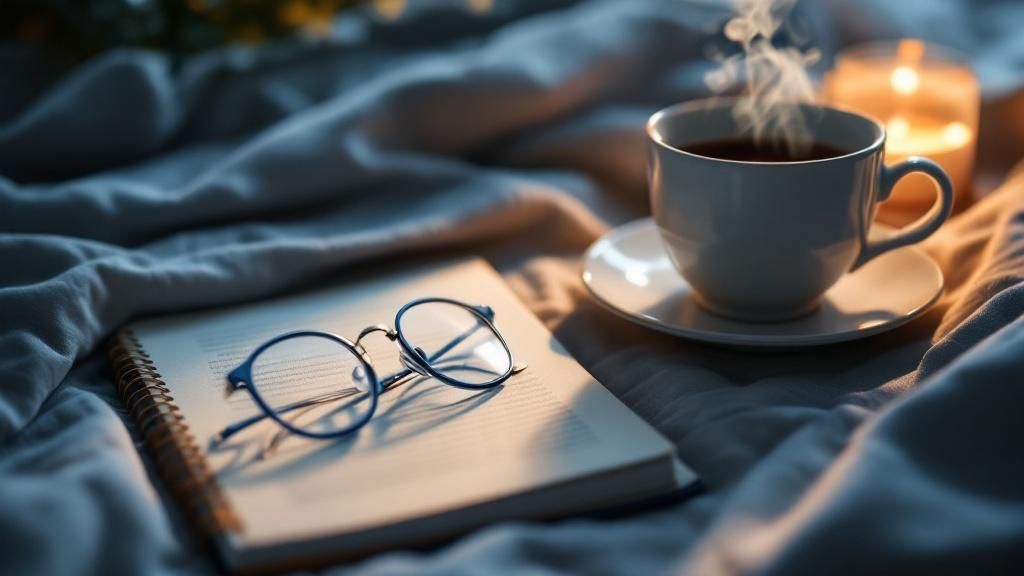
Just having a pair of blue light glasses for sleep isn’t the whole story—making them work for you is all about timing and consistency. The real magic happens when you weave them into your nightly schedule. Your goal is to create a sort of "digital sunset" for your brain, sending a clear signal that the day is winding down and it's time to prepare for rest.
So, when’s the best time to put them on? The sweet spot is 1 to 3 hours before you plan to fall asleep. This timing is crucial. It gives your body a generous window to stop the disruptive signals from artificial light and start producing melatonin right on schedule.
Building Your Wind-Down Ritual
Think of your glasses as a powerful tool in a larger sleep hygiene toolkit. The benefits really stack up when you combine them with other healthy evening habits. This helps create a solid wind-down ritual that your brain quickly learns to associate with sleep.
Try layering these simple actions into your routine:
- Dim the Lights: Lower the brightness on the lamps and overhead lights in your home. This helps mimic the soft, gentle light of a natural sunset.
- Lower Screen Brightness: Even with your glasses on, turning down the intensity of your phone or TV screen can reduce overall visual stimulation.
- Listen to Calming Audio: Instead of a high-stakes TV show, switch to a relaxing podcast, an audiobook, or some quiet music.
While blue light glasses are a fantastic start, you can get even better results by mixing in other effective habits for better sleep.
The explosive growth of this market shows just how many people are looking for these solutions. The global blue light glasses market hit a value of $2.9 billion in 2024, largely driven by concerns over sleep quality and the screen time that comes with remote work and education. It's projected to more than double, reaching $5.8 billion by 2034, a surge tied directly to how well these glasses filter the specific light messing with our internal clocks.
A Sample Evening Timeline
Making this a habit is a lot easier than you might think. Here’s a simple timeline that shows how you can seamlessly fit blue light glasses into your night.
Your Pre-Sleep Action Plan:
- 8:00 PM (3 Hours Before Bed): Dinner is done. Time to put on your blue light glasses. Your digital sunset has officially begun.
- 9:00 PM (2 Hours Before Bed): Start dimming the lights in the living room and bedroom. If you're still watching TV or scrolling on a tablet, keep those glasses on.
- 10:00 PM (1 Hour Before Bed): Put all the screens away. Pick up a physical book, do some light stretching, or just listen to music.
- 11:00 PM: Head to bed feeling relaxed, with your body's melatonin production already in full swing.
Answering Your Top Questions
Even after seeing all the science, it's completely normal to have a few more questions before you're ready to try a pair for yourself. Let's tackle some of the most common ones I hear, so you can feel confident you're making the right choice for your sleep.
Should I Wear Blue Light Glasses All Day?
If your main goal is to improve your sleep, then no, you absolutely shouldn't. Think about it: your body actually needs natural blue light from the sun during the day. It's a key signal that tells your brain it's time to be awake, alert, and focused.
For sleep, the magic happens in the evening. The sweet spot is to put on your glasses about 1 to 3 hours before bed. This creates a "digital sunset," blocking the artificial blue light from screens and bulbs precisely when your body should be winding down and producing melatonin.
Do All Amber Tinted Glasses Block Blue Light?
Not at all, and this is a critical point. While any colored lens will filter some light, a simple amber tint you might find on cheap glasses doesn't guarantee protection from the specific wavelengths that wreck your sleep.
True blue light glasses designed for sleep are engineered and tested to filter out the high-energy light that is most disruptive to melatonin.
Crucial Takeaway: Always look for brands that are transparent and provide a detailed spectral report for their lenses. This is the only real proof that the glasses are filtering the right light to deliver the sleep benefits you’re paying for.
Can Blue Light Glasses Cure My Insomnia?
They are an incredibly powerful tool, but they aren't a magic cure-all. If your trouble sleeping is directly tied to scrolling on your phone or watching TV late at night, then yes, they can make a night-and-day difference. They work by removing a major modern roadblock to sleep, letting your body's natural sleep processes finally do their job.
However, insomnia can be complex. Its roots can be in stress, diet, or other medical issues. These glasses are most effective when they're part of a solid sleep hygiene routine. So, if you're wondering if anti-blue light glasses can help you sleep better as part of a larger plan, the answer for most people is a definite yes.
Ready to create your own "digital sunset" and reclaim your rest? Spektrum Glasses combines science-backed lens technology with stylish frames to help you fall asleep faster and wake up refreshed. Explore our collection of sleep-enhancing glasses today.
